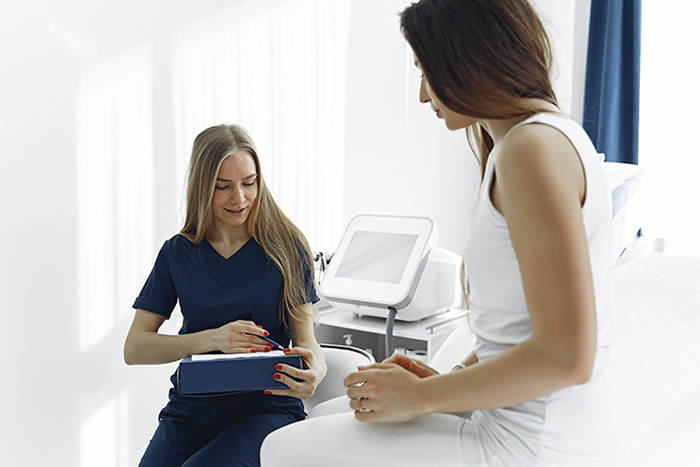Pregnancy cravings often begin in the first trimester as hormonal shifts influence taste and smell...
Read More
Navigating endometriosis can be a daily struggle, but rest assured, Inspira offers personalized treatment plans and compassionate support to ease your symptoms.
Endometriosis is a medical condition where tissue similar to the lining inside the uterus grows outside the uterus. This misplaced tissue can grow on the ovaries, fallopian tubes, outer surface of the uterus and other organs within the pelvis. Unlike the regular endometrial tissue that sheds during menstruation, this tissue can’t exit the body, leading to inflammation and scar tissue formation.
The exact cause of endometriosis is not fully understood. Some researchers think it may be linked to retrograde menstruation, where menstrual blood flows backward through the fallopian tubes into the pelvic cavity instead of leaving the body. It may also involve genetic factors, immune system disorders or hormonal imbalances.
Endometriosis can vary greatly. The condition is classified into four stages based on the location, extent and depth of endometrial tissue implants, as well as the presence and severity of scar tissue and adhesions. Some people with advanced-stage endometriosis may have minimal symptoms, while others with milder stages may experience severe pelvic pain and other symptoms. This variability makes endometriosis a complex condition to diagnose.
Endometriosis symptoms can differ widely from person to person. Here are some common symptoms to look out for:
Diagnosing endometriosis starts with a detailed medical history and a pelvic exam to check for abnormalities. Your doctor may order imaging tests like ultrasounds or MRIs to identify cysts or other issues related to endometriosis. If endometriosis is suspected, your doctor will perform a laparoscopy, a minimally invasive procedure where a camera is inserted into the pelvic cavity to look for endometrial tissue outside the uterus. During this procedure, a biopsy can confirm the diagnosis.


Over-the-counter pain relievers can help manage pain and reduce the progression of endometriosis. Hormonal therapies, like birth control pills or medications that lower estrogen levels (called GnRH agonists), can also be prescribed to control hormone levels and reduce endometrial tissue growth.

In some cases, more extensive surgery may be necessary. Surgical options may include laparotomy, a procedure with larger incisions to remove endometrial tissue or a hysterectomy , which removes the uterus and sometimes the ovaries.

Minimally invasive procedures such as laparoscopy can remove or destroy endometrial tissue outside the uterus. This procedure involves small incisions and is often effective in reducing pain and improving fertility.
We believe in a personalized approach to treating endometriosis. By understanding your unique symptoms and medical history, we tailor our treatment plan to your needs. Our multidisciplinary team provides a range of options, from minimally invasive to advanced interventions, all aimed at improving your quality of life.
We combine medical and holistic care, including pain management, hormonal therapies, and lifestyle changes. If surgery is necessary, our team uses the latest minimally invasive techniques to reduce recovery time and improve outcomes. Throughout treatment, we prioritize open communication, compassionate care, and continuous support to help you manage endometriosis and reclaim your well-being.
If left untreated, endometriosis can lead to progressively worsening symptoms and complications. Chronic pelvic pain and heavy menstrual bleeding may become more severe, affecting your daily activities and quality of life. Untreated endometriosis can also lead to scar tissue formation and adhesions, which can cause organs to stick together and result in significant pelvic pain. Over time, the condition can lead to more complex surgical needs and potential long-term health issues, emphasizing the importance of early diagnosis and treatment.
Yes. The condition can cause inflammation and scar tissue, which may obstruct the fallopian tubes, interfere with ovulation or affect embryo implantation. Early diagnosis and appropriate management can improve fertility outcomes. If you're experiencing difficulties conceiving and suspect endometriosis, talk to a fertility specialist to explore your options and develop a tailored treatment plan.
There is no cure for endometriosis, but there are effective treatments available to manage your symptoms and improve your quality of life. Ongoing research aims to increase understanding of the condition and develop more effective therapies. Managing endometriosis often requires a long-term, individualized approach to address each patient's unique needs.
Yes, lifestyle changes can play a significant role in managing endometriosis symptoms. Regular exercise, a balanced diet and stress management techniques can help you reduce pain and improve overall well-being. Avoiding inflammatory foods, including those high in sugar and trans fats, may also help you control your symptoms. Talk to your ob/gyn about any lifestyle changes you're considering to ensure they complement your treatment plan.
Supporting a loved one with endometriosis involves understanding and empathy. Educate yourself about the condition to better appreciate your loved one's experiences and challenges. Offer emotional support by listening and being patient, and encourage them to seek professional medical help. Respect their need for rest when needed and offer practical support, like assisting with daily tasks when they're experiencing symptoms.

Pregnancy cravings often begin in the first trimester as hormonal shifts influence taste and smell...
Read More
Dysphoric milk ejection reflex (D-MER) is a condition that causes sudden negative emotions during...
Read More
Polycystic Ovary Syndrome (PCOS) affects millions, yet many misconceptions still surround this...
Read More